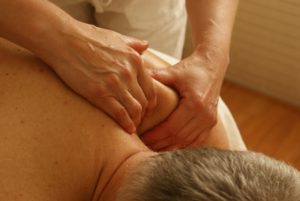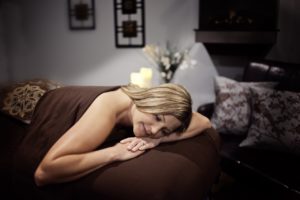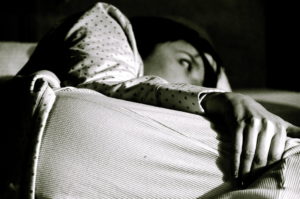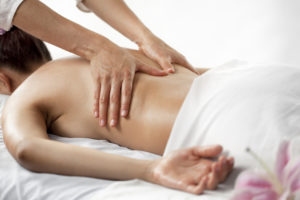21% of adults report feeling more stressed when they do not get enough sleep, and stress in your daily life can make it difficult to get enough rest at night.
Sleep deprivation and stress create a cycle that compromises your physical, mental and overall health.
To break this cycle, it’s important to find approaches towards reducing stress responses during the day and promoting a healthier sleeping pattern.

Massage can be an effective tool, aiding sleep and stress reduction in a number of ways. A massage can alleviate any discomfort you’re experiencing, which may be keeping you awake, and helps stimulates chemical responses throughout the brain and body which help you relax.
If you’re in the throes of a stress and sleep deprivation cycle, massage can help you get back on the path to wellness.
Managing Anxiety and Depression With Massage
While stress is a normal part of everyday life, it may be more difficult to manage if you’re struggling with mental illness. The body reacts to stress by releasing hormones like adrenaline, dopamine, and cortisol, which prepare your body for a flight or fight response.
When you’re lying in bed, however, these hormones are far less useful than they may have been thousands of years ago when your body was preparing to fight a bear. Cortisol is the last thing you want surging through your system when you’re trying to sleep. Melatonin, on the other hand, is the hormone associated with sleep and helps calm a busy mind.

A massage promotes a sense of wellbeing that triggers serotonin in the brain, which helps facilitate the production of melatonin.
Getting adequate rest can improve symptoms of depression and anxiety, giving you the energy to exercise, eat right and take care of yourself throughout the day.
Massage Helps Calm Down an Overactive Mind
Many people who do not have mental health issues or a sleep disorder may still struggle to sleep under certain circumstances. A new environment can make sleep challenging even for those who typically rest easily, experiencing what scientists refer to as “the first night effect.”

This reaction occurs as the body physiologically gears up to respond to any potential threat in an unfamiliar place. Studies show that while sleeping in an unfamiliar surrounding, a region within the left hemisphere of the brain remains alert and prepared to react to the environment.
While the first night effect is clearly seen when traveling to a new place, it also helps explain why it may be difficult to sleep during transitional phases of life, like starting a new job, a divorce or having a babyIf you’re staying at a hotel that has a spa, book a massage to help you rest better at night.
You’ll be able to better enjoy your vacation or find yourself more productive on a work trip when you’ve had a full night of uninterrupted sleep.
Better Sleep and Faster Healing
When you’re physically uncomfortable, due to illness, injury, pregnancy for any other reason, it can make it difficult to get enough rest. Massage relaxes the muscles, tendons, and joints and helps the body manage its neurological response to pain.

When you’re in less pain, you’re likely to sleep better, and when you sleep better, your physical health improves. A good night’s rest will give the energy to exercise and stretch, which can be beneficial in recovering from a sports-injury or managing arthritis.
Reducing stress through better sleep also helps release tension in the body to mitigate pain and discomfort.
If you’re struggling with insomnia, take time to schedule a massage. Massage can be an important act of self-care, benefiting both your physical and mental health. Poor sleep and stress go hand and hand, and massage can help you deal with both to enjoy a better quality of life.

